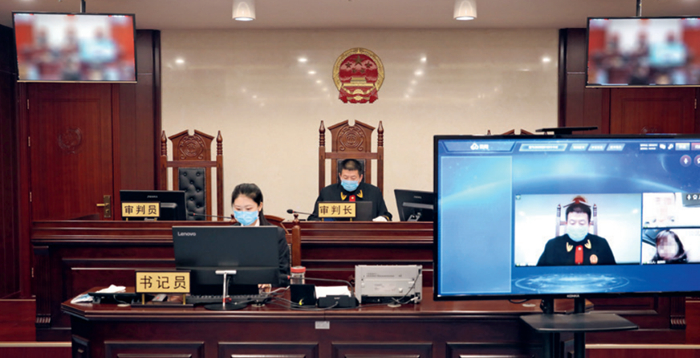|
||||||||||
| Home Nation World Business Opinion Lifestyle ChinAfrica Multimedia Columnists Documents Special Reports |
|
||||||||||
| Home Nation World Business Opinion Lifestyle ChinAfrica Multimedia Columnists Documents Special Reports |
| ChinAfrica |
| Advancing Law-Based Governance |
| China has seen significant progress in rule of law over the past decade |
| By Wang Hairong 丨VOL. 14 JUNE 2022 ·2022-06-17 |

A judge and other staff of a mobile court on their way to serve villagers in Gongshan, Yunnan Province, on August 30, 2019 (XINHUA)
“Comprehensively advancing law-based governance is an essential requirement and important guarantee for socialism with Chinese characteristics,” reads the Resolution of the Communist Party of China (CPC) Central Committee on the Major Achievements and Historical Experience of the Party Over the Past Century, which was adopted at the Sixth Plenary Session of the 19th CPC Central Committee in November 2021.
Solid progress has been made in advancing the rule of law in China since the 18th CPC National Congress in 2012. Top-level designs and major plans have been put forward to ensure sound legislation, strict law enforcement, impartial administration of justice, and observance of the law by all.
Overarching guidelines
Advancing the rule of law has been incorporated into the Four-Pronged Comprehensive Strategy for the country’s development, put forth by President Xi Jinping in 2014, which also consists of completing the building of a moderately prosperous society in all respects, expanding in-depth reform and enforcing strict Party self-governance.
Also in 2014, the Fourth Plenary Session of the 18th CPC Central Committee adopted a decision to advance the rule of law. Then in 2017, after the 19th CPC National Congress, the CPC Central Committee established its Commission for Overall Law-Based Governance and made major decisions on promoting law-based governance in all fields.
The CPC’s first-ever central conference on work related to overall law-based governance took place in November 2020, marking the establishment of Xi Jinping Thought on the Rule of Law and its status as the guiding thought for law-based governance. Major principles of the thought include upholding Party leadership on overall law-based governance, taking a people-centered approach, and adhering to Constitution-based governance.
The Party has emphasized that law-based governance should reflect people’s interests and wishes, protect their rights, enhance their wellbeing, and protect and promote social fairness and justice, according to the 2021 decision.
Legislative achievements
China’s legal system has become more full-fledged in the past decade.
Since 2012, 68 new laws have been enacted and 234 laws have been amended by the National People’s Congress (NPC) and its Standing Committee. This has brought the country’s total number of effective laws to 292.
“The number of new laws enacted over the last decade has increased by one third compared with the decade before, and the number of laws amended has nearly doubled,” Xu Anbiao, Deputy Head of the Legislative Affairs Commission of the NPC Standing Committee, said while summing up China’s legislative progress at a press conference on April 25.
Basic, comprehensive and guiding laws in important fields such as national security, health and culture have been formulated and promulgated; laws in other important fields such as the environment, education, and science and technology have been systematically and comprehensively revised, according to Xu. Breakthroughs have been made in legislation in emerging fields such as network information and biosafety.
Amendments to the Constitution were adopted at the First Session of the 13th NPC in 2018. The amendments have established the guiding role of Xi Jinping Thought on Socialism with Chinese Characteristics for a New Era in China’s political and social life, and underline the importance of the Party’s leadership.
Another milestone in Chinese legislation during the last decade is the adoption of the Civil Code, the first of its kind in the People’s Republic of China.
Xu hailed it as a “major achievement in advancing socialist rule of law with Chinese characteristics” and said that “it has incorporated socialist core values and the concept of green development into civil legal norms.”
The Civil Code comprises sections on real rights, contracts, personality rights, marriage and family, inheritance, and tort liabilities, as well as general and supplementary provisions. It addresses issues that people are concerned with, including new problems emerging from such areas as urbanization, environmental protection and other digital technologies.
Moreover, the lawmaking process has embodied the concept of whole-process people’s democracy. “The voice of the people can be heard in all stages of law making, including the drafting, deliberation and adoption of a law, so as to ensure that the legislation reflects the common will of the people,” Xu said.
In the past, only the first draft of a law was published to solicit public opinions, whereas now, after the first draft has been revised according to public feedback, the second draft will also be published for public comment.
Another important area of progress is the establishment of community-level legislative outreach offices. At present, 22 such offices have been established nationwide and comments have been collected via the platforms for more than 130 laws, Xu said.

An intermediate court in Taiyuan, Shanxi Province, holds an online trial on February 10, 2020 (XINHUA)
Judicial progress
In the past decade, efforts have also been made to advance reform in the judicial, procuratorial, and public security domains to ensure the fairness, integrity, efficiency and authority of law enforcement and judicial work.
“Focus has been placed on removing bottlenecks that undermine judicial fairness,” said Shen Liang, Vice President of the Supreme People’s Court, at a press conference on April 22.
In 2015, courts changed their case filing procedure from accreditation to registration. Now more than 95.7 percent of cases can be filed upon submission, according to Shen.
Reform has also been carried out to hold judges accountable for the cases they adjudicate; give play to the oversight role of tribunal and court presidents, and strengthen the supervision and management of important, difficult or complex cases; and make the handling and supervision of cases traceable throughout the whole process.
In addition to courts, procuratorial organs have also taken measures to ensure judicial fairness. Yang Chunlei, Deputy Procurator General of the Supreme People’s Procuratorate (SPP), said at the press conference that the SPP has made great efforts in rectifying wrongful convictions, holding those behind the decisions accountable, and stepping up oversight to prevent negligence of duty and abuse of power.
The reform in the legal sectors has provided a strong guarantee for social and economic development in China, and enables people to enjoy safer lives. A survey conducted by the National Bureau of Statistics in 2021 showed that 98.6 percent of respondents felt safe living in the country.
“China has been recognized as one of the safest countries in the world,” Jing said.
|
||||||||||||
| About Us | Contact Us | Advertise with Us | Subscribe |
| Copyright Beijing Review All rights reserved 京ICP备08005356号-5 京公网安备110102005860号 |